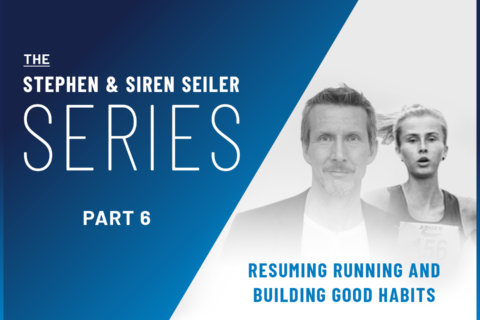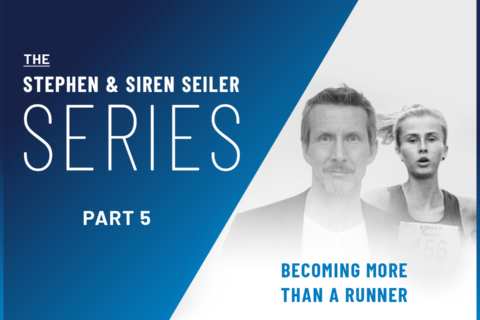Effective self-talk isn’t a tool solely reserved for race days or elite performances. Producing a positive frame of mind through inner dialogue can help improve training, recovery, and life in general, all of which can lead to better performances and health.
Self-talk comes in two forms: One method is unconscious (autonomic), and can be developed with proactive work; the other method is conscious, deliberate, and finite.
Effective self-talk can take different forms—some athletes thrive on positive self-talk, while others need “negative” motivators. Regardless of its nature, athletes can create a sense of competence by using self-talk productively—by being proactive and consistent—as Coach Grant Holicky explains in this workshop.
Video Transcript
Chris Case 00:00
Welcome back Grant Holicky of forever endurance to Fast Talk Labs.
Grant Holicky 00:03
Thanks for having me.
Chris Case 00:04
We are talking today about the subject of self talk. Now every athlete out there talks to themselves in some way, about performance, about training about life, about a lot of things that are going on in their life. Today, though, we’re talking about effective self talk, what that means and how to get it.
Grant Holicky 00:21
Right, and we use the term effective self talk, you’ll hear a lot of people say positive self talk. But some athletes are going to thrive on negative self talk. So we want to know, and we want to work on what’s effective for your performance, how you talk to yourself, and how you keep yourself honestly, in a really good frame of mind, just in general, that’s going to allow you to approach training, allow you to approach racing, and then allow you to approach the rest of your life in a positive framed outlook.
Chris Case 00:48
All right, let’s explore.
Chris Case 00:59
Welcome to Fast Talk Laboratories, your source for the science of endurance performance.
Meaning of self talk
Chris Case 01:09
I want you to explain for us grant, what do you actually mean by self talk, this inner dialogue that athletes have.
Grant Holicky 01:16
So there’s two different types of self talk, and Danny Kahneman, a famous economist, basically define these two types of self talk, there’s an autonomic self talk, the self talk that just comes up and it happens. And that’s trainable. But those things that we say about ourselves or say to ourselves are just going to appear in the moment, we don’t necessarily have control of when they come. And then there’s deliberate self talk. And deliberate self talk is how we battle back against what’s going on. And that might be you’re really struggling in a race and your mind screaming, I’m dying, I’m dying, and you decide to talk back and say, You know what, I’ve done my training, I’m fit, I’ve got this. And the problem with deliberate self talk is, it’s not indefinite, as as time goes on, it will be exhausted, and you will no longer be able to battle back against the self talk. That’s coming autonomically. So what we need to do is we need to approach how we talk about ourselves or to ourselves proactively. And we need to get better at reframing situations, and sharing what it is that we want to happen instead of just letting it all come. So again, like so many things that we’re talking about, this isn’t a quick fix this is how do I practice this? How do I prepare this? And how do I get better at this? That way, I can improve my autonomic self talk so that it’s supportive. And then I have this deliberate self talk reservoir that I can use when things start to go maybe the wrong way or sideways.
Chris Case 02:53
Right, right. Well, I think it’s worth reminding people, what do you mean, when you say reframe things?
Grant Holicky 02:59
Right? So often in life, and in my favorite example of this, and we all know I work a lot with high school kids, but we can all remember being in this place. And you went in and everybody took a test and everybody’s walking out of the classroom. And you know, for me, it was the late 80s. And you’re walking out of the classroom and your peg jeans and somebody says to you, how’d that test go? You almost never hear a high school student go, “it was great man I aced that”. You hear, “I failed it, it was so hard, It was so bad”. And we hear it in adults, we we almost have gotten to the point in states where we greet each other and say, How are you and almost everything I hear is I’m tired, I’m struggling, or I’m having a hard time. If that were really the definition of our life in that moment, we’d be in a hard place. But if we can make the choice to choose to focus on the real things in our life that are going well, that’s not this toxic positivity that we can’t back up, that’s real and we can hang our hat on it. And that really goes a long way into reframing how you’re looking at your situation. So how that pertains to sport is, how am I going to do today? And and if I say to you, Chris, we’re going to a cross race on the weekend, how are you going to do today? That’s really Mercurial right? One day, you could wake up and go, my legs feel great. I’ve got the good sensations as the Belgian saying, like, I’m gonna kill it. And typically, we ride the way we talk. So what we’re trying to do is reframe our big picture. And focus choose to focus on those positive points doesn’t mean the negative points aren’t there. Doesn’t mean we’re not going to we’re just going to ignore them and throw them out. But we have to put as much weight in what’s going well as we do and what’s going poorly.
How to use self talk
Chris Case 04:47
Okay, so we’ve got this situation where you need to reframe something and self talk is a really significant tool here. How do you use it?
Grant Holicky 04:55
So I think one of the things that’s important is as you go through your training, it’s the start to Find those things that as we mentioned before, you can hang your hat on, right. And that means, you know, I had an athlete years ago and she was approaching a big meet and she was really struggling. And she just, I can’t find things that are going right, this and that. And I said, Well, what do you feel good about right now. So well, I just got all my gear, and I looked really good in my gear. And I told her to go home that night, and she put on her suit, her cap, her goggles, and I said, Go stand in front of the mirror, and think about how good you look. And she came back the next day, and she’s like, I look so good, I look so fast, and she lit it up. So it really is about finding those things in the moment, they have to be real, it’s not enough just to look in the mirror and go, everything’s gonna be okay. But those real things don’t have to be the dominant thing. And so we find those real things. And then we build our self talk around those things that we know are real, and we know are positive. I’m training as much as I’ve ever trained right now. I’m I hit that wattage that day in my workout. I really nailed this workout a couple weeks ago, one of the things I suggest athletes do is star those workouts that were just really, really special. So the dangers, right? Yeah. So when you’re looking back at your training peaks, or your training log, you can go Oh, look at that, that was great. Because if you’re in the moment, and you’re struggling with how you feel, that’s gonna be the overwhelming sensation. So finding these things that we can hang our hat on, and then talking to ourselves about those things. I finished races Great. So if something were to happen, and I always feel like I finished these races really, really well, that’s that self talk that’s going to come up. And if we do it enough, it starts to become autonomic.
How coaches can guide self talk
Chris Case 06:45
Okay, so you, I know the term is self talk, you continue to talk about someone having an inner dialogue with themselves. But I got to think that a coach can play a critical role here in guiding what that self talk looks like and facilitating.
Grant Holicky 07:00
Absolutely. And I think one of the things that I think has been lost in the coaching profession over the last couple years, is how we glorify coaches. And what we put out there, what you see on TV is the coach yelling and screaming and firing people up and getting their faces and tearing people down when something went wrong. But that’s not really what we respond to, we respond to positivity, we respond to somebody reminding us of our strengths. And that’s really what positive psychology becomes about is how much can we focus on what we do well already, and then put ourselves in that really good frame. And then we can start to look at those opportunities to improve. And so a coach can be that sounding board, that when somebody comes to you and says, Hey, I’m really struggling, I don’t feel fit. I don’t feel like I’m technically sound, hey, yeah, but look at that workout two weeks ago, you were amazing. Look at that, look at that corner at that race, you are unbelievable remember your sprint here, you won that sprint. So I think it comes back to the coach to have the ability and the willingness to go, Hey, I’m going to be your objective observer. In this situation, I’m going to be the one that can say, I remember this when you’re in that frame that doesn’t really remember anything positive. And so it doesn’t have to be a coach, it can be a training partner, it can be a life partner, it can be anybody at any time, that just becomes that backstop that goes, Hey, just take a second. Think about some of those things that you’ve done really, really well in the last couple weeks because they’re there. And then that becomes the foundation of your self talk, and then choose to remind yourself of those things over and over and over again. And that helps that self talk become your prevailing autonomic self talk. And that’s going to help you in those tough situations.
Self talk in practice
Chris Case 08:54
Just one last question for me. What does this look like in daily life? Is there a time when you will sit down and practice this? Or is it only before a certain big event? What What does it look like in practice?
Grant Holicky 09:06
You know, I think for different people, it’s different things, right? I think that this is where visualization comes in. Really, really handy for an athlete, sit down, visualize yourself, in a race, visualize yourself with everything going right. But visualize yourself with everything going wrong. One of the things that Michael Phelps used to do and I think we’ve talked about this in a previous episode, is visualizing the worst case scenarios for his races. He got out of the water in the Olympics, when his goggles fell off and said, Well, I had already played through that in my head. But putting yourself as real as possible in those situations, and then practice the self talk that brings you through those situations. So I do think that this is a great thing to do. Maybe when you’re just laying in bed, or Heck, you can do it while you’re eating your cereal in the morning. And this is the thing that you can do in those first 10-15 minutes of a ride. There’s plenty of people Places to Work this in. It doesn’t have to be in a dark room with the with earplugs in and a mask on. It can be any place at any time. And just a little bit, and, and anything that you can do that brings the race butterflies come brings that realness. Now your brain is going, Oh, this is how I deal with that situation. And then when it comes in real life, you’ve got tools to help buffer against it.
Chris Case 10:26
Excellent. Always a pleasure, Grant Holicky, thank you again.
Grant Holicky 10:29
Yeah, it’s always great to be here.
Chris Case 10:30
Thanks for joining us here at Fast Talk Labs. If you want to join the conversation, check out our forum, hit Grant with questions you might have or give him an example of how you use self talk in your racing and training life.
Grant Holicky 10:43
Yeah, we really learn from each other. So we’d love to hear from you and see what you’re doing. That’s really what this whole profession is about is understanding what everybody’s doing and how we use those things to help everybody else.





